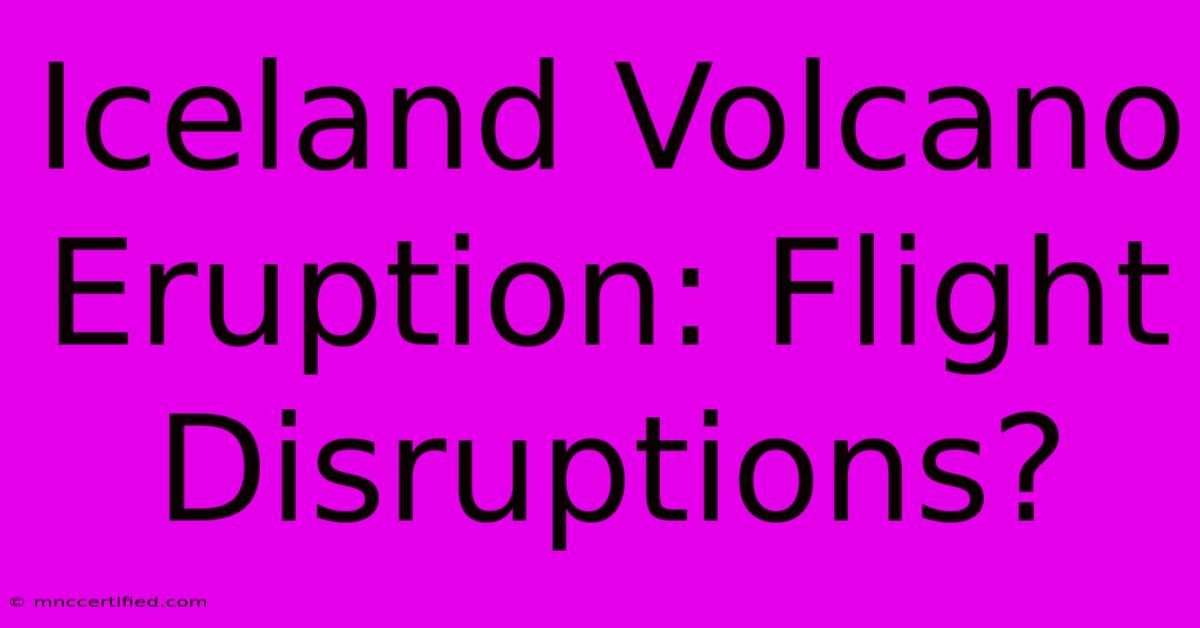Iceland Volcano Eruption: Flight Disruptions?

Table of Contents
Iceland Volcano Eruption: Flight Disruptions? A Comprehensive Guide
Iceland, the land of fire and ice, is known for its stunning landscapes and active volcanoes. While these volcanoes contribute to the island's dramatic beauty, their eruptions can significantly impact air travel, causing widespread flight disruptions. This comprehensive guide explores the potential for flight disruptions during Icelandic volcanic eruptions, offering insights into how to prepare and what to expect.
Understanding the Volcanic Threat to Flights
Iceland sits on the Mid-Atlantic Ridge, a boundary between two tectonic plates. This geological setting makes it highly volcanically active. Eruptions can eject vast quantities of ash high into the atmosphere, posing a serious threat to aircraft engines. Volcanic ash is composed of tiny, sharp particles that can melt at high altitudes, causing engine failure. This risk necessitates flight cancellations and diversions when volcanic ash clouds reach significant concentrations in the airspace.
Key Factors Affecting Flight Disruptions:
- Ash Cloud Height and Density: The higher and denser the ash cloud, the greater the impact on air travel. Meteorological agencies closely monitor ash cloud movement and concentration.
- Wind Direction and Speed: Prevailing winds determine the path of the ash cloud, influencing which airspace is affected. Strong winds can disperse the cloud more quickly, potentially reducing disruption.
- Volcanic Eruption Severity: The intensity and duration of the eruption directly correlate with the size and longevity of the ash cloud. Larger, more prolonged eruptions lead to more extensive and longer-lasting disruptions.
- Aircraft Type and Engine Design: Modern aircraft have improved ash-resistant engines, but complete avoidance of ash clouds remains a safety priority.
How to Prepare for Potential Flight Disruptions
Planning ahead is crucial when traveling to or from Iceland during periods of volcanic activity. Here's how to mitigate the impact of potential flight disruptions:
- Monitor Volcanic Activity: Regularly check reputable sources like the Icelandic Meteorological Office (IMO) and the aviation authorities for updates on volcanic activity and any resulting airspace closures.
- Travel Insurance: Comprehensive travel insurance is strongly recommended. Ensure your policy covers flight cancellations and disruptions due to unforeseen circumstances, including volcanic eruptions.
- Flexible Travel Plans: Booking flights with flexible dates and allowing extra time for your journey can help minimize the impact of potential delays.
- Contact Your Airline: Stay in close contact with your airline before and during your trip. They can provide the most up-to-date information on flight status and alternative arrangements.
- Alternative Transportation: Consider alternative transportation options, such as ferries, if flights are significantly delayed or cancelled. However, be aware that these options may also be affected by volcanic activity indirectly (e.g., port closures due to ashfall).
What to Do if Your Flight is Disrupted
If your flight is cancelled or delayed due to a volcanic eruption:
- Remain Calm: Panic won't solve the problem. Follow the instructions of airline staff and airport authorities.
- Check for Updates: Continuously monitor updates from your airline and relevant authorities.
- Seek Accommodation: If your delay is significant, arrange alternative accommodation. Your travel insurance might cover these expenses.
- Contact Your Travel Provider: Inform your travel agent or tour operator about the situation, as they may be able to assist with rebooking or other arrangements.
Beyond Flight Disruptions: Other Impacts of Volcanic Eruptions
While flight disruptions are a major concern, volcanic eruptions can have other impacts:
- Air Quality: Volcanic ash can significantly reduce air quality, potentially causing respiratory problems for some individuals.
- Ground Transportation: Ashfall can disrupt road and rail travel, leading to delays and closures.
- Tourism Impacts: Areas close to the eruption site may be temporarily inaccessible to tourists.
Staying informed and prepared is key to minimizing the disruption caused by Icelandic volcanic eruptions. By following these guidelines, you can navigate potential travel challenges more effectively and ensure a safer journey.
Keywords: Iceland volcano eruption, flight disruptions, volcanic ash, Iceland travel, flight cancellations, air travel, volcanic activity, Icelandic Meteorological Office, travel insurance, flight delays, aviation safety, air quality, travel planning, volcano safety.

Thank you for visiting our website wich cover about Iceland Volcano Eruption: Flight Disruptions?. We hope the information provided has been useful to you. Feel free to contact us if you have any questions or need further assistance. See you next time and dont miss to bookmark.
Featured Posts
-
I Have A Bridge To Sell You Meme
Nov 21, 2024
-
1 D Members Reunite For Paynes Service
Nov 21, 2024
-
Uks John Prescott Ex Deputy Pm Passes Away
Nov 21, 2024
-
Australian Teen Dies In Laos Methanol Poisoning
Nov 21, 2024
-
Car Insurance Ypsilanti Michigan
Nov 21, 2024